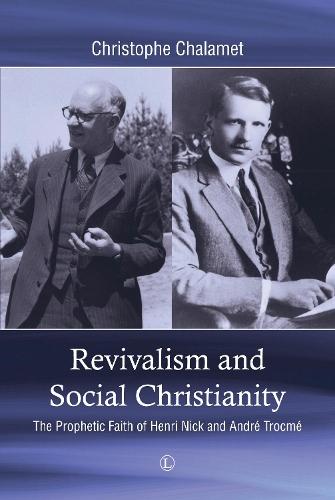Full Product Details
Author: Christophe Chalamet
Publisher: James Clarke & Co Ltd
Imprint: Lutterworth Press
Dimensions:
Width: 15.30cm
, Height: 1.30cm
, Length: 22.90cm
Weight: 0.349kg
ISBN: 9780718895037
ISBN 10: 0718895037
Pages: 232
Publication Date: 28 September 2017
Audience:
General/trade
,
General
Format: Paperback
Publisher's Status: Active
Availability: Available To Order

We have confirmation that this item is in stock with the supplier. It will be ordered in for you and dispatched immediately.
Reviews
People marvel that the folk at Le Chambon took in the Jews. But what Chalamet helps us see is this did not come out of the blue. Rather, this was made possible by people such as Henri Nick and Jacques Kaltenbach, whose discovery of the social dimensions of the gospel made [the actions of] Trocme possible. The implications are clear-heroism is the outworking of lives that never appear heroic. -Stanley Hauerwas, Professor of Theological Ethics, Duke Divinity School Based on original archival research, Chalamet richly fills in the background of the famous events at Le Chambon, where the Christian community, led by Andre Trocme, saved the lives of thousands of Jewish children during the Nazi occupation of France... Nonviolent social action and spirituality were forged in a crucible of courage and suffering to produce a new and compelling version of the Social Gospel. -George Hunsinger, Professor of Systematic Theology, Princeton Theological Seminary This book helps us rediscover the deep spiritual and social influence in the first half of the twentieth century of the Protestant movement known as the Social Gospel. The author unveils the ties between two great pastors, Henri Nick and Andre Trocme, who sought to evangelize the workers and who contributed to the rescue of Jews during the Holocaust. The result is a real contribution to the history of twentieth-century France. -Patrick Cabanel, Professor of Late Modern History, University of Toulouse-Le Mirail
People marvel that the folk at Le Chambon took in the Jews. But what Chalamet helps us see is this did not come out of the blue. Rather, this was made possible by people such as Henri Nick and Jacques Kaltenbach, whose discovery of the social dimensions of the gospel made [the actions of] Trocme possible. The implications are clear-heroism is the outworking of lives that never appear heroic. -Stanley Hauerwas, Professor of Theological Ethics, Duke Divinity School Based on original archival research, Chalamet richly fills in the background of the famous events at Le Chambon, where the Christian community, led by Andre Trocme, saved the lives of thousands of Jewish children during the Nazi occupation of France. . . . Nonviolent social action and spirituality were forged in a crucible of courage and suffering to produce a new and compelling version of the Social Gospel. -George Hunsinger, Professor of Systematic Theology, Princeton Theological Seminary This book helps us rediscover the deep spiritual and social influence in the first half of the twentieth century of the Protestant movement known as the Social Gospel. The author unveils the ties between two great pastors, Henri Nick and Andre Trocme, who sought to evangelize the workers and who contributed to the rescue of Jews during the Holocaust. The result is a real contribution to the history of twentieth-century France. -Patrick Cabanel, Professor of Late Modern History, University of Toulouse-Le Mirail
Author Information
Christophe Chalamet is Associate Professor of Theology at the University of Geneva, Switzerland. He is the author of Dialectical Theologians: Wilhelm Herrmann, Karl Barth and Rudolf Bultmann (2005).




